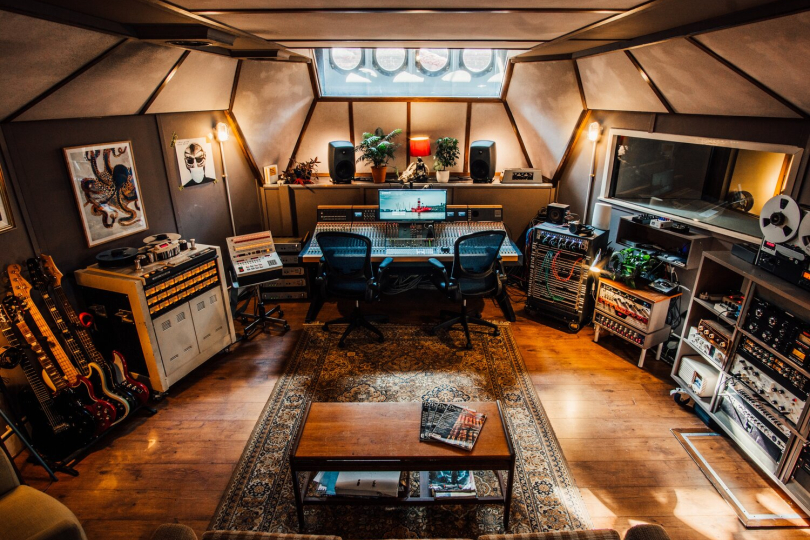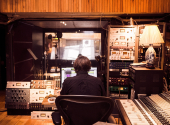
5 Types of Recording Studios You Need to Know
Recording studios are a natural part of music-making. Only a few active musicians have not experienced recording in them. Recording music starts with the first tentative attempts to capture your musical ideas and it usually leads to a big dream – to make a professional recording that sounds great. But what do each of us imagine when talking about recording studios? Let's take a look at different types of studios and their specific uses, focus and target audience.
We'll go through the five basic types – from the modest home recording studio where we explore our first ideas, through studios designed to make demo recordings, to production and professional recording studios. Finally, we'll briefly mention specialist studios aimed at clients with specific requirements. This article aims to detail the importance of each type of studio at different stages of music production and may answer the question of which studio is best suited for your music project at the moment.
1. Home studio
Home recording studios have experienced an unprecedented boom in recent years mainly due to the availability of modern technology. Nowadays, all you need is a computer with the right software, one microphone, headphones, a cheap sound card and MIDI keys and you can start recording, producing and mixing music in surprisingly high quality. This opens up a huge space for creativity right in your home without having to invest large amounts in renting a professional recording studio. It's probably no surprise that many of the world's biggest hits have been created in home studios.
You can easily record vocals, acoustic guitar, electric guitar, bass or even keyboards in such a studio. Recently I've come across bands whose members each have such a simple studio at home, allowing them to create ideas which they can send to each other over the internet.
Of course, a home recording studio is not primarily about making money but rather about creativity. The modest equipment of a home studio helps in practising a musical instrument, composing, arranging songs etc. And best of all, you can get it for the price of a weekend in the mountains. I loaded up my cart with basic home studio gear and came up with a price of less than 500 EUR (not including the computer, which you probably have).
Basic home studio setup:
2. Studio for recording a band demo
In my practice as a sound engineer and music producer, I most often encounter two types of bands. Those who have tried recording in their rehearsal room and those who have been thinking about it for a long time. No wonder, the opportunity to make a demo recording provides a band a unique chance to step back from their performance and get some much-needed feedback. Suddenly you can hear a lot of details that are easy to miss in a standard rehearsal. In addition, setting up such a studio also forces musicians to think about the acoustics of the rehearsal room and whether they should finally do something about the humming bass.
Recording your whole band at once is no longer the prerogative of expensive recording studios. Again, a Macbook, a simple sound card and a couple of microphones will do. Believe it or not, I've heard decent demo recordings that were made on an iPhone. In that case, the acoustics of the rehearsal room and the careful placement of the phone in the space are essential.
Demos made in this way are for internal band purposes. It's a way to improve and "feel" the song, so to speak. Demo recordings are important for editing arrangements, lyrics, form and other building blocks of a song before recording it in a professional studio. Any producer will applaud you if you come to the first meeting with your own demo recordings. In this way, you will also save on making demo recordings in the studio.
Young people often ask me, "How do you get into the world of sound? Where do I start?" Well, I think a great place to start is a studio for recording band demos. Start by recording your band and you'll see that over time you'll start to have friends from other bands coming up to you and saying, " Hey, record something for us, too!" You can even make some extra money. If they only want to rent your home studio and record everything themselves, feel free to charge them a symbolic rental fee per hour.
Again, when I put the gear for a basic recording in a standard setup in my basket, the price tag was between 1000 and 2000 euros depending on the quality of the gear chosen, again not including the cost of the computer and the acoustic design of the room.
Basic studio equipment for recording demos:
3. Production studio
I dare say this type makes up the largest group of recording studios. This includes small production studios set up for recording vocals or instruments in tracks but also larger studios set up for recording whole bands together. These are often studios for local bands but it is not uncommon for well-known artists to use them. Such studios can be found in every major city. They are great and never go out of fashion. New ones are being created all the time and in many ways, they can compare to professional studios.
The most common limitation of production studios is their size. They are created in barns, garages, and stand-alone buildings on the owners' property, or you can find them in various rented spaces. You can record bass, vocals, guitars and keyboards in them, and then use one of the large professional studios to record more space-demanding instruments like drums or pianos. The equipment of these studios in my experience starts somewhere around 8 000 euro.
4. Professional studio
I have long wondered where the imaginary line between a production studio and a professional studio actually is, and it has to be said that in many cases the two groups overlap. You cannot take it that production studios cannot achieve professional results.
In the end, I came to the conclusion that professional studios often have more sound engineers who work there full-time to make their living. Such studios have fixed prices per day and usually have multiple recording rooms, sometimes even multiple studios per se. Prices for recording in such studios vary a lot, they can range from 500 to 2,000 euros per day or more. They are often run by several people. They have a specific owner, a manager, a booking manager, of course, a local in-house sound engineer, but often other external sound engineers who are able to fully operate all the studio equipment.
These studios can cater for a wide range of projects from large ensembles, through post-production, film music mixes, mastering and so on. They are often equipped with full facilities from a kitchenette through a relaxation room to accommodation. The equipment in such studios runs into hundreds of thousands of euros. Often you will find expensive vintage microphones, preamps, mixers and other valuable analogue equipment. Professional studios are not afraid to invest in expensive equipment because they use it every day, so they are sure that this gear will surely pay off sooner or later.
The advantage of a professional studio tends to be generous space. They are ideal for recording large ensembles, piano and percussion. Here bands can record together, which gives the recordings a great feel, plus it's fun! You can sound the drum kit with lots of mics, use remote room mics, and put the overhead mics high, easily 2-3 meters above the kit. In general, high ceilings give drums a great sound. In addition, such rooms are often specially designed to make the reverb controllable and not too long. The sound has room enough to develop. Small rooms can't develop the bass frequencies that are important for getting a naturally dense sound.
A professional studio is a huge investment that needs to be taken seriously. Such a studio eats up a lot of work, time and energy. It takes a full calendar to get a studio like this going, and most importantly you need contacts, not just to musicians but people from film, TV, radio and ad agencies. Local bands can't support a large professional studio.
5. Specialist studios
Studios for electronic music production
They are equipped with synthesizers, drum machines, MIDI controllers, samplers etc. Acoustics are less important in this case, as there is no recording of acoustic instruments.
Post-production studios
They focus on the sound editing of films, series or commercials. They are usually equipped to record dubbing and voiceovers. They are involved in creating foley effects for films and sound design. They often emphasize surround acoustics and monitoring (such as Dolby Atmos).
Mastering studios
Studios focused exclusively on the final editing of recordings. They are equipped with state-of-the-art listening systems, analogue and digital mastering processors and acoustically perfect rooms. They work with detailed frequency and dynamic balancing of recordings for commercial distribution.
Podcast studios
A big hit of late is podcast studios dedicated to the recording and post-production of spoken word, podcasts, radio broadcasts and audiobooks. They are equipped with appropriate microphones and editing software.
Mobile studios
These are used for live recording, for example, concerts, festivals or recording in unique locations. They are usually technologically adapted for quick setup and fieldwork.
In conclusion: what is actually the most important thing?
Whichever studio you choose, remember that the key factor for a good recording is not just the gear but above all an experienced sound engineer. Even a modest studio can do wonders, while an inexperienced sound engineer can ruin your recording even in the most professional studio.
And what is your experience of recording in a studio? Let us know in the comments below this article on Facebook.
If you have found an error or typo in the article, please let us know by e-mail info@insounder.org.





